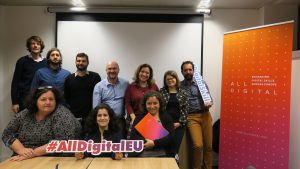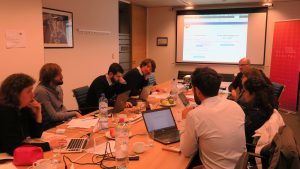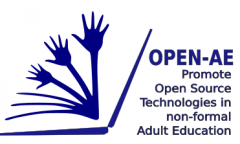
A new Erasmus+ KA2 project on Strategic partnerships for Adult Education has started. ALL DIGITAL is the coordinator of the project OPEN-AE: Promote Open Source Technologies in non-formal Adult Education, which will be implemented with four other ALL DIGITAL member organisations. Open-AE was awarded through EPOS, the National Agency for Erasmus+ programme in Flanders.
The project will promote open source technologies in non-formal adult education to support the digital upskilling of both educators and learners. Its aim is to build capacity of non-formal training organizations, such as digital competence centers, to deliver high quality and relevant digital skills training to adults by improving staff competence on open source technologies. The project objective is to improve teaching and digital skills of e-facilitators through a modular blended course on open source technologies.
Open-AE will promote access and learning through Open Educational Resources (OER). It includes the generation of open educational content on open source technologies, using open technologies for its production. It will promote open access to such content through a modular blended course (on-line and f2f seminars) and the generation of such content by the participants (e-facilitators) through work projects on open source technologies, as part of their training.
Digital Competence Framework for Educators (DigCompEdu) will be adopted to map the Open-AE course curriculum. Specifically, 10 e-facilitators will be trained in each project country on open source technologies through the Open-AE modular blended course. This will lead the creation of sustainable communities of practices around open source technologies, which will facilitate outreach to other educators, adult users and stakeholders across Europe.
The project was kicked off in Brussels on 12-13 December 2018 at the ALL DIGITAL office. As the project started already on 1 November, partners had previoulsy met at the ALL DIGITAL Summit in Brussels and held an online meeting to start activities.
The kick off meeting then focused on preparing the Open-AE curriculum. To do so, partners will research and prepare national reports for participating countries and one European report on the state of open source technologies in non-formal education. Partners will also hold focus groups with e-facilitators to understand their needs. Together the information from the national reports and focus groups will develop the backbone of the Open-AE training curriculum. The training curriculum will then be piloted in all participating countries on 10 e-facilitators. In total 40 efacilitators will be trained.
The pilot and Open-AE curriculum is expected to be a valuable resource for many ALL DIGITAL members. The Open-AE project was developed following the ALL DIGITAL 2017 members survey, wherein key challenges faced by e-facilitators working with adult learners in centres for non-formal education and digital competence centres were identified:
- the need of innovative approaches to develop digital skills in light of rapidly changing technologies there need to be more user-focused modules on the development of skills;
- the need to shift focus to the development of adaptable digital competences and not merely skills in light of these rapidly changing technologies;
- the need to use standardised frameworks like DigComp and DigCompEdu.
From these three challenges, the priorities for the Open-AE curriculum were set :
- promote access and learning through Open Educational Resources (OER);
- promote Open Source (OS) technologies in the non-formal educational sector to support the upskilling of adult educators and learners;
- address adult trainers working in the non-formal educational sector to reinforce digital skills and competences. To achieve this end, OPEN-AE will adopt the DigCompEdu in the develop of its training curriculum.
The partnership also involves:
- Yinternet.org – a Swiss organisation dedicated to empowering citizenship and training on tools for socio-professional development and has a strong expertise in open technologies and collaborative skills training programmes addressed to adult learners;
- Associazione Centro Studi di Foligno – an Italian training agency with a long-term experience in delivering of continuous and permanent training programmes to adult learners and in coordinating and participating in transnational projects focused on digital skills and digital innovation using open source technologies;
- Maks vzw – a Brussels-based NGO recognized as a non-formal adult education center. Maks runs an IT learning centre where people can take low-cost courses or workshops tailored to their needs and a counselling service, helping people to get a job. Annually, Maks coaches about 500 adult jobseekers;
- Colectic – a Spanish non-profit organisation working in fields related to community networks and technology. It promotes the use of open technologies to improve the situation of communities and citizens’ groups, with special attention to the weakest groups (NEETs, unemployed people, women, migrants etc.).

